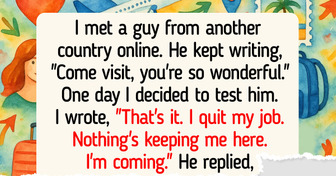8 People Who Experienced Eerie Things That Are Too Hard to Grasp


The topic of menstruation often remains shrouded in mystery and discomfort. Despite its natural and essential role in women’s health, the periods can evoke fear and unease among men, largely due to misconceptions and lack of education. This fear is not only rooted in a misunderstanding of the biological process, but also in the cultural stigmas that have persisted for generations.
Surprisingly, men still don’t know a lot about women’s periods. Many men wrongly believe you can’t pee with a tampon in, think tampon sizes are for different cavities, and are clueless about periods, assuming women lose a gallon of blood each cycle.
In 2021, INTIMINA, a period product brand, surveyed 1,091 American men on their understanding of menstruation. Astonishingly, 14% had never discussed periods with a woman, a quarter thought tampons must be removed to urinate, and 11% believed women can’t get pregnant during their period.
Even stranger misconceptions emerged: 4% of men thought tampons and periods could get lost in the genitalia, and 8% believed menstruation attracts sharks in the ocean.
The interviewees claimed they saw no difference between menstrual blood and other types of blood. However, their initial reactions to seeing menstrual blood contradict this, revealing a sense of disgust. There is also a strong association between menstrual blood and bodily waste in the minds of the interviewees, with many men likening menstruation to feces.
On a positive note, 78% of men surveyed believed it was essential to educate boys about periods. Researchers suggest that involving boys and men in the conversation is crucial for normalizing menstruation. Positive case studies show that educating boys about periods reduces stigma and misinformation.
Here are some stories from our readers who had to deal with negative reactions to menstruation:
“I was at the mall today, wearing my favorite white pants, completely unaware that my period had started. Out of nowhere, a guy noticed the stain and sneered, ’That’s disgusting, women should just stay home during their periods.’ I was mortified and quickly left, but his cruel words only strengthened my resolve to never let ignorance shame me again.”
“Today, my teenage daughter came home in tears because her period had started during class, and she hadn’t noticed. Some boys mocked her, with one of them cruelly saying that women’s blood is awful and girls are dangerous.”
Jane Bennett, founder of the Chalice Foundation, shared her experience educating fathers about periods. She found that fathers who understand and support their daughters through puberty make a significant positive impact on their daughters’ confidence and body image. This support helps girls manage their periods confidently and develop a healthy attitude towards their menstrual cycle, improving their overall well-being.
Men can play a vital role in breaking the menstrual taboo by learning about periods and discussing them openly. Let’s move beyond myths and misconceptions and treat menstruation as the natural and important topic it is.
Menstrual periods are starting earlier for younger generations. The study showed that younger participants had their first period at a younger age and took longer to have regular cycles.
For those born from 1950-1969, the average age for the first period was 12.5 years, with 8.6% having early periods and 0.6% having very early periods. For those born from 2000-2005, the average age was 11.9 years, with 15.5% having early periods and 1.4% having very early periods. The percentage of girls with regular cycles within two years of their first period dropped from 76% to 56% between these groups.
Understanding the menstrual period is crucial for both genders as it fosters empathy and reduces stigma around a natural biological process. This knowledge also promotes better communication and support within relationships, contributing to overall well-being and gender equality.











